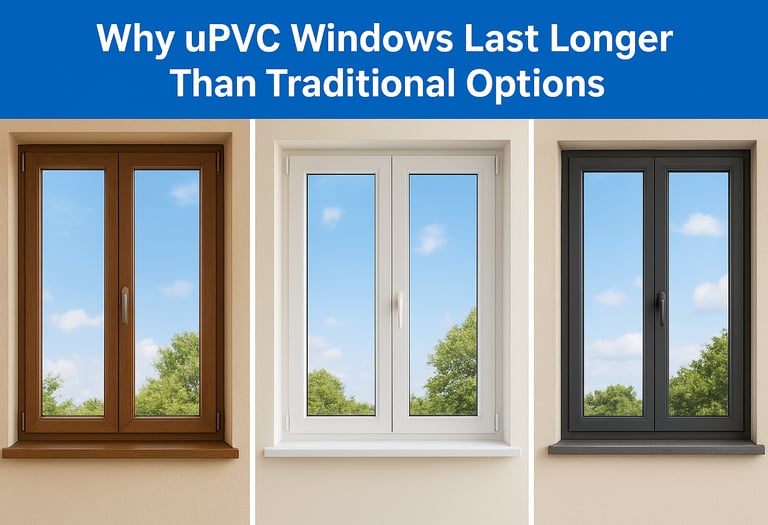Enjoy exclusive discounts on our stylish windows!
Why uPVC Windows Last Longer Than Traditional Options
9/10/20253 min read


Introduction to uPVC Windows and Their Durability
uPVC—or unplasticized polyvinyl chloride—is now a go-to material for windows. It's strong and lasts, so it’s a great pick over wood or aluminum. Wood windows can rot or bend, and aluminum can rust. But uPVC holds up, even when the weather is bad. This makes it a solid, easy-to-care-for choice for both homeowners and builders.
Unlike wood that soaks up water or metal that rusts, uPVC isn't bothered by water, bugs, or termites. You don't have to polish, seal, or paint it, which cuts down on the work needed to keep it looking good. Plus, uPVC windows have special designs with multiple chambers and can use double or triple panes of glass. This means better insulation, keeping homes comfy and saving energy all year.
The Lifespan of uPVC Windows
One great thing about uPVC windows is how long they last. Typically, they'll be good for 25 to 40 years. That's way longer than wooden windows, which usually only last 10 to 20 years, and a bit better than aluminum ones at 20 to 30 years. They last because the material resists moisture and doesn't rust, swell, crack, or fade without problems.
For comparison:
Wooden windows → tend to rot, attract termites, and warp.
Aluminum windows → are strong, but they can rust near the coast or in humid places.
Because they last so long, uPVC windows are a good investment.
uPVC vs Wooden Windows: A Comparison of Durability
Wooden windows look great, but they need work. You've got to paint, seal, and protect them from termites. If you don't keep up with it, they'll fall apart fast.
uPVC windows are safe from rot, termites, and water issues. Just clean them with soap and water, and they'll stay looking good as new.
All in all, uPVC windows last longer and are easier to take care of.
uPVC vs Aluminium Windows: Which Lasts Longer?
Aluminum windows are strong, look good, and have slim frames, but they can corrode and transfer heat easily. Rust is a problem, especially near the coast.
uPVC windows don't corrode, they handle temperature changes well, and they naturally insulate against heat and cold.
In conclusion: Aluminum is stronger, but uPVC is better when it comes to how long it lasts, not rusting, and keeping heat in or out.
Maintenance-Free Benefits of uPVC Windows
People choose uPVC windows because they're so easy to take care of.
You don't have to polish, repaint, or seal them.
They also don't rust, get eaten by termites, or corrode.
Just wipe them down with a damp cloth every now and then to keep them looking good.
This saves you time and money in the long run.
Weather Resistance and Other Advantages of uPVC Windows
India's weather, with its hot summers and strong monsoon rains, is no match for uPVC.
Here's why:
Heat: It stays strong and doesn't break, even when it's super hot.
Rain: It isn't bothered by rain or wet air.
Sun: Its color stays true, even with lots of sun.
Energy: It keeps heat from moving in or out, so you save on energy costs.
uPVC windows also help keep noise out, making your home more relaxing.
Conclusion: uPVC Windows as the Superior Choice for Indian Homes
uPVC windows are a great choice compared to old-fashioned wood or aluminum ones. They can last up to 40 years, don't need much upkeep, and can handle all kinds of weather and pests. Plus, they help save on energy costs, making them a good long-term investment. For Indian homes that deal with different types of weather, uPVC windows offer a mix of strength, good price, and comfort.
When you go with uPVC, you're not just getting windows that last longer. You're also getting less worry and lower costs down the road.
Contact us to Explore the Range of UPVC Windows & Doors
info@astrapia.net
08069409604
© 2025. All rights reserved.
24x7 CUSTOMER CARE NO:
Bengaluru
Belagavi
Nagpur
Bhubneswar
Head-Office
# 38, Nanjappa Layout,Somashettihalli,Bengaluru - 560090
